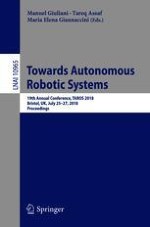2018 | OriginalPaper | Buchkapitel
A Hormone Arbitration System for Energy Efficient Foraging in Robot Swarms
verfasst von : James Wilson, Jon Timmis, Andy Tyrrell
Erschienen in: Towards Autonomous Robotic Systems
Aktivieren Sie unsere intelligente Suche, um passende Fachinhalte oder Patente zu finden.
Wählen Sie Textabschnitte aus um mit Künstlicher Intelligenz passenden Patente zu finden. powered by
Markieren Sie Textabschnitte, um KI-gestützt weitere passende Inhalte zu finden. powered by
